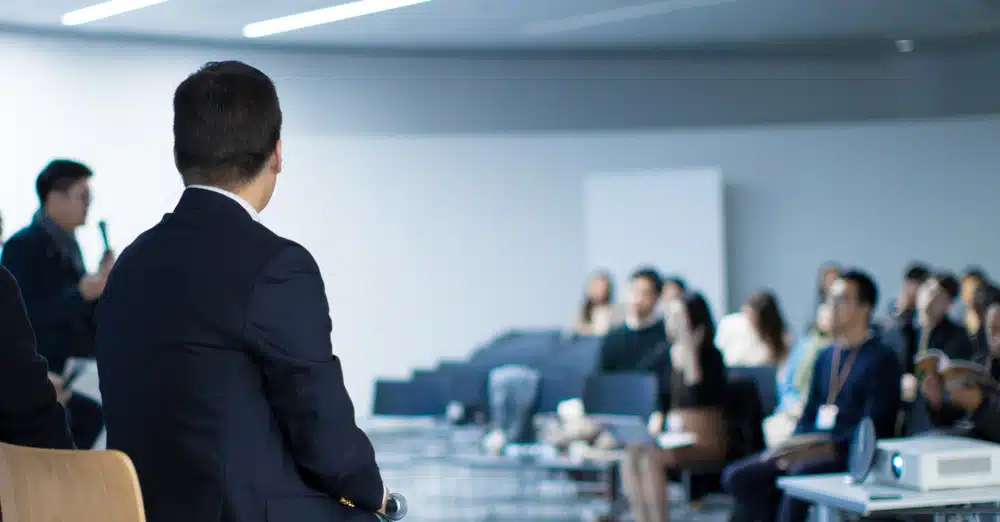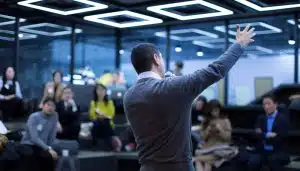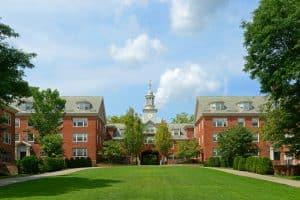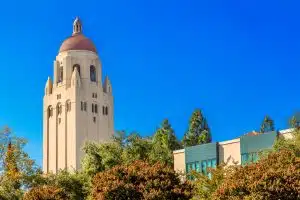Brown Debate Team
Debate teams are at the crux of intellectual challenges and are vital in shaping a powerhouse of thinkers. Brown University houses one such debate team that has consistently proven its mettle on various platforms.
In this article, we will delve deep into the world of debating and the prestigious Brown University Debate Team.
Understanding the Art of Debate
Debate is more than just a verbal clash of ideas. It teaches you the influential art of persuasion, the delicate balance of logic and emotions, and the beauty of a well-structured argument.
When engaging in a debate, expressing your thoughts and opinions is not enough. The art of persuasion comes into play, where you must skillfully craft your words to convince others of the validity of your viewpoint. Rhetoric and persuasion play an instrumental role in swaying the perspective of anyone who engages in the argument. They imbue language with the power to challenge, provoke, convince, and inspire.
The Importance of Rhetoric and Persuasion
Learning to articulate your opinions effectively is the backbone of successful debating. You can genuinely make an impact through the mastery of rhetoric and persuasion. These skills form the bedrock of the Brown University Debate Team’s strategy. Each member is trained in the nuances of debate language and the effective use of rhetoric and persuasion to make compelling arguments.
Imagine captivating an audience with your words, leaving them in awe of your ability to present a well-reasoned and persuasive argument. The power of rhetoric lies in its ability to evoke emotions to make people feel and connect with your message. It is a skill that can be honed and perfected, and the Brown University Debate Team knows this all too well.
Through rigorous training and practice, team members learn to use rhetorical devices such as ethos, pathos, and logos to their advantage. They understand the importance of appealing to the audience’s emotions, establishing credibility, and presenting logical reasoning. This combination of persuasive techniques allows them to sway opinions and win debates.
Mastering Logical Reasoning and Critical Thinking
A debater must have the ability to think critically and reason logically. These skills are essential for constructing solid arguments and effectively countering opposing viewpoints. The Brown University Debate Team recognizes the significance of logical reasoning and critical thinking in debate.
Training sessions designed to hone these skills are integral to their regimen. Team members engage in exercises and activities that challenge their ability to analyze information, identify fallacies, and construct sound arguments. Logical reasoning enables the team to present tightly held arguments and refute opposing ones, while critical thinking facilitates the identification of loopholes in the opposing arguments.
Through the mastery of logical reasoning and critical thinking, the Brown University Debate Team has emerged victorious in multiple debating competitions. Their ability to dissect complex issues, evaluate evidence, and construct compelling arguments sets them apart from their competitors.
So, the next time you debate, remember it is not just about expressing your opinions. It is about mastering the art of persuasion, harnessing the power of rhetoric, and employing logical reasoning and critical thinking. Doing so can elevate your arguments to new heights and leave a lasting impact on your audience.
The Brown University Debate Team: A Closer Look
As with any team, the Brown University Debate Team comprises a diverse mix of individuals who bring unique insights. These students come from various academic disciplines, such as political science, philosophy, economics, and communication studies, reflecting a comprehensive breadth of perspectives that invigorates their performances.
Key roles within the team include the President, Vice-President, and Treasurer, supported by various Committee Chairs and General Members. Each team member plays an essential role and contributes to the team’s success. The team’s diversity is its strength, allowing the creation of robust and elaborate arguments from various perspectives.
However, being a Brown University Debate Team member is not for the faint of heart. The training regimen is rigorous and demanding, designed to push the limits of each team member and prepare them to handle the intensity of national and international debates.
The team has weekly practice sessions, where they engage in mock debates to understand the mechanics of a competitive debate. These practice sessions allow team members to refine their argumentative skills, practice their delivery, and learn from one another’s strengths. Additionally, the team incorporates workshops to strengthen specific skills like research techniques, quick thinking, public speaking, and teamwork.
Methods of preparation extend beyond the practice sessions and workshops. Team members spend countless hours researching potential debate topics, diving deep into scholarly articles, books, and reputable sources to gather evidence and develop well-rounded arguments. They also engage in the art of crafting sound arguments and counterarguments, honing their ability to think critically and persuasively.
Furthermore, the team undertakes consistent debate response drills, simulating high-pressure situations to enhance their ability to think on their feet and respond effectively to opposing arguments. These drills help team members develop the agility and quick thinking necessary to navigate the fast-paced world of competitive debate.
How Do You Become a Member?
Well, it’s not a straightforward path; it’s a multi-step process that tests your debating skills, character, commitment, and intellectual curiosity. You’ll undergo a rigorous recruitment process, meet specific skill requirements, and face interviews and auditions. Let’s not forget the financial aspects—scholarships and sponsorships are in the picture.
The Recruitment Process: It’s More Than Just Talking
The recruitment process for Brown University’s debate team is a comprehensive evaluation designed to sift out the most promising candidates. It’s not just about how well you can argue a point; it’s about your research ability, understanding logical fallacies, teamwork skills, and even grace under pressure.
Typically, the recruitment season starts with an open call for applications, followed by a series of workshops and mock debates. These initial stages serve as a filtering mechanism, allowing the coaches to identify potential team members who proceed to the next selection rounds.
Skill Requirements: What Are They Looking For?
So, what exactly is Brown University’s debate team looking for in its members? First and foremost, a strong foundation in logical reasoning is a must. You should be able to construct and deconstruct arguments with finesse. But that’s just the tip of the iceberg.
Effective communication skills are crucial—you must articulate your thoughts clearly and persuasively. Emotional intelligence is another critical factor; the ability to read your opponent and the audience can give you a significant edge. Additionally, a good grasp of current events and a wide range of topics will serve you well, as debate topics can vary wildly.
The Interview and Audition: A Two-Pronged Approach
After surviving the initial rounds, you’ll be invited for an interview and an audition. The interview is not merely a formality; it’s an opportunity for the coaches to gauge your personality, commitment to the team, and intellectual curiosity.
You’ll be asked questions that test your critical thinking and ethical viewpoints. The audition, on the other hand, is where you showcase your debating prowess. You’ll be given a topic in advance to prepare for, but be ready for a curveball—sometimes, you’ll have to debate an issue you’ve just been handed. This two-pronged approach ensures that Brown University’s debate team comprises well-rounded individuals who excel in skill and character.
Financial Aspects: Scholarships and Sponsorships
Joining a debate team, incredibly one as prestigious as Brown University’s, can be a financial commitment. Travel for competitions, debate materials, and coaching sessions can add up. But here’s the good news: there are scholarships and sponsorships available.
These financial aids are often merit-based but can also be need-based. The team usually partners with organizations and alums willing to sponsor promising debaters. So, if finances are a concern, know there are avenues to make your debate dreams a reality without breaking the bank.
Achievements of the Brown University Debate Team
The Brown University Debate Team has a formidable track record of excellence in college debate. With a history rooted in rigorous training and a commitment to intellectual rigor, the team has consistently demonstrated its prowess on the debate stage.
Notable Wins and Recognitions
The team has garnered numerous accolades over the years. They have been crowned champions at the prestigious American Parliamentary Debate Association Championship, a testament to their exceptional argumentation, critical thinking, and persuasive speaking skills. Their victories in this highly competitive arena have solidified their reputation as one of the top debate teams in the nation.
Moreover, individual team members have also gained recognition for their stellar performances, testifying to the team’s collective strength and individual brilliance. From winning prestigious speaker awards to being selected for national debate tournaments, these achievements highlight the exceptional talent and dedication of the team’s members.
Impact on the University and Broader Community
Beyond victories, the Brown University Debate Team plays a vital role in promoting intellectual vibrancy and fostering a democratic environment that values open discussion. Through rigorous practice sessions, the team cultivates critical thinking skills, research abilities, and persuasive communication among its members.
The team’s success has given Brown University global recognition in the field of debate. As ambassadors of the university, they have represented Brown on national and international stages, showcasing the institution’s commitment to academic excellence and intellectual rigor. Their achievements have brought pride to the university and attracted talented debaters from around the world to join the Brown community.
The Brown University Debate Team has significantly impacted the broader community by holding public debates on pressing issues. Engaging in thoughtful and well-reasoned discussions fosters an environment of intellectual discourse and critical thinking. These public debates are platforms for exchanging ideas, challenging societal norms, and encouraging individuals to think deeply about complex issues.
Furthermore, the team actively participates in outreach programs, visiting local schools and community centers to promote the art of debate. Through workshops and interactive sessions, they inspire young minds to develop their analytical skills, articulate their thoughts effectively, and engage in respectful and constructive dialogue.
The Future of the Brown University Debate Team
The Brown University Debate Team constantly looks towards the future, setting goals and strategizing to achieve them. With a rich history of success, the team is determined to maintain its position as one of the top debate teams in the country.
Upcoming Competitions and Goals
The Brown University Debate Team is gearing up for the next season of competitions. Armed with determination, rigorous training, and strategic planning, the team is set to continue its legacy of excellence in the coming years. The team is set on prestigious tournaments such as the National Debate Tournament and the World Universities Debating Championship.
Strategies for Continued Success
A solid commitment to developing analytical and rhetorical skills forms the foundation of the team’s strategy for victory. The training regimen will continue to evolve, incorporating new skills and tactics to keep up with the evolving landscape of debate tournaments. The team will focus on honing their research skills, mastering different debate formats, and enhancing their ability to construct persuasive arguments.
In addition to their commitment to skill development, the team will prioritize teamwork and collaboration. They understand that success in debate depends not solely on individual brilliance but also on the ability to work cohesively as a team. Regular team meetings, practice sessions, and mock debates will be organized to foster a supportive and collaborative environment.
Furthermore, the team is actively seeking opportunities to engage with other debate teams and experts in the field. They plan to attend workshops, conferences, and debate camps to learn from experienced debaters and gain exposure to diverse perspectives. By constantly seeking to expand their knowledge and network, the team aims to stay at the forefront of debate trends and techniques.
Recognizing the importance of community outreach, the Brown University Debate Team also plans to organize public debates and workshops for local high schools and community organizations. By sharing their expertise and passion for debate, they hope to inspire the next generation of debaters and contribute to the growth of the debate community.
The Role of Debate in Personal and Professional Development
Active involvement in debate offers valuable benefits that extend beyond winning trophies. It plays a significant role in personal and professional development. Debate is not just a competitive activity; it is a platform that fosters the growth of various skills essential for life’s success.
By participating in debates, individuals gain critical thinking skills that enable them to analyze complex issues from multiple perspectives. This ability to think critically and objectively is highly valued in today’s society, where information is abundant, and the ability to discern truth from falsehood is crucial.
In addition to critical thinking, debate also hones strategic planning skills. Debaters learn to formulate persuasive arguments, anticipate counterarguments, and strategically present their ideas to persuade others. This skill is valuable for formal debates and everyday situations where effective communication and persuasion are necessary.
Research is another vital skill that debaters develop. To construct well-informed arguments, debaters must conduct thorough research on various topics. Gathering and analyzing information helps individuals become more knowledgeable about different subjects. Moreover, the research skills acquired through debate can be applied in academic and professional settings, where the ability to gather and synthesize information is highly valued.
Furthermore, debate enhances public speaking skills. Debaters must present their arguments confidently and articulately in front of an audience. This experience helps individuals overcome stage fright, develop strong communication skills, and become influential public speakers. These skills are essential for success in debate competitions and various professional fields where effective communication is critical.
The Long-Term Benefits of Debate Experience
Participation in debates ideally positions an individual for success in numerous professional fields, including law, politics, academia, business, journalism, and more. The skills gained through debate are highly transferable and can be applied to various career paths. For example, lawyers must be skilled at constructing persuasive arguments, politicians must articulate their ideas convincingly, and journalists must possess the ability to analyze critically and present information.
Moreover, debate experience goes beyond professional success. It equips individuals with the tools to navigate complex social and personal situations quickly and confidently. Debaters learn to listen actively, understand different perspectives, and engage in constructive dialogue. These skills are essential for building solid relationships, resolving conflicts, and fostering empathy and understanding in diverse communities.
Given these attributes, it’s no wonder that students from the Brown University Debate Team go on to excel in multiple fields, owing their success to the invaluable skills and experiences gained through their engagement in debate.
Ready to Take Your College Journey to the Next Level?
Are you impressed by what you’ve learned about Brown University’s debate team? Are you inspired to hone your debating skills and other extracurriculars to boost your college application? You’re on the right track, but why stop there? At AdmissionSight, we specialize in helping high-achieving students like you turn their college dreams into reality.
We understand that joining a prestigious debate team is just one piece of the puzzle. From personalized academic planning to expert essay editing, we offer a comprehensive range of services designed to highlight your unique strengths and passions. Our goal? To help you gain admission to elite universities like Brown and thrive once you’re there.
Don’t leave your college future to chance. Let AdmissionSight guide you through the complexities of the college admissions process, ensuring that you stand out in the highly competitive applicant pool.








































